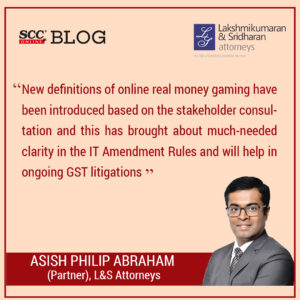On 6-4-2023, the Ministry of Electronics and Information Technology notified the Information Technology (Intermediary Guidelines and Digital Media Ethics Code) Amendment Rules, 2023 to amend the Information Technology (Intermediary Guidelines and Digital Media Ethics Code) Rules, 2021.
Key Points:
1. The definition of “online game” has been inserted which means that “a game that is offered on the Internet and is accessible by a user through a computer resource or an intermediary”.
2. A clause has been inserted that emphasizes if the online game that can cause harm to the user, then it is the duty of the intermediaries and grievance redressal mechanism to inform the user of its computer resource not to host/display/upload/modify/publish/transmit/store/update/share any information of that harmful online game.
3. A proviso to Rule 3(1)(f) has been inserted that says that if an online gaming intermediary has enabled the users to access any permissible online real money game will have to inform its users of such change as soon as possible, but not later than 24 hours after the change is affected.
4. Rule 4 relates to Additional due diligence to be observed by significant social media intermediary wherein sub-rules have been inserted that focuses on any permissible online real money game. In such cases, online gaming intermediaries:
• have to display a demonstrable and visible mark of verification of such online game by an online gaming self-regulatory body on such permissible online real money game.
• Will not itself finance or enable financing to be offered by 3rd party.
5. Rule 4-A (Verification of online real money game) has been inserted:
• The Ministry can designate as many online gaming self-regulatory bodies as it thinks is necessary for verifying an online real money game.
• The regulatory authority, on their websites/ mobile based application, have to maintain the details of the applicants, dates and period of validity of verification, dates of acceptance as member, their corporate/ business related identity number, reasons of verification, details of suspension/ revocation.
• Every online gaming self-regulatory body will prominently publish on its website/mobile based application, the framework for redressal of grievances and the contact details of the Grievance Officer.
• Upon making an application, the self-regulatory authority, after conducting an inquiry declare such online real money game as a permissible online game if it is satisfied that:
i. It does not involve wagering on any outcome
ii. Is in compliance with provisions relating to the age at which an individual is competent to enter into a contract
6. Rule 4-B (Applicability of certain obligations after an initial period) has been inserted which says that the obligations under Rule 3 and Rule 4 of the Information Technology (Intermediary Guidelines and Digital Media Ethics Code) Rules, 2021 will be applicable to online games only after expiry of 3 months.
7. Rule 4-C (Obligations in relation to online game other than online real money game) says that if the Central Government considers the necessity in the interest of the sovereignty and integrity of India/ security of State/ friendship with foreign States, can direct the intermediary to make necessary alterations without affecting the main point.
Asish Philip Abraham, Partner, Lakshmikumaran & Sridharan Attorneys on IT Intermediary Amendment Rules 2023:

“Trust shown by the government in the self-regulatory mechanism will boost innovation and competition in the sector. With the introduction of the IT Intermediary Amendment Rules, 2023, the onus will be on SROs to determine whether a gaming company’s games entail wagering on any outcome. SROs will have to ensure that the assessment of the same is based on existing jurisprudence as laid down by the Supreme Court of India on the determination of games of skill from games involving wagering and betting. It will also be interesting to see the enforcement approach for gaming companies operating outside the SRO framework.

New definitions of online real money gaming have been introduced based on the stakeholder consultation and this has brought about much-needed clarity in the IT Amendment Rules and will help in ongoing GST litigations. The introduction of diligence requirement of content not causing “user harm” will require further clarification on the ministry level to bring parity in the understanding amongst SROs and Gaming Companies.”








